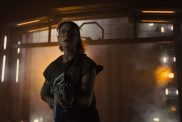Cast:
Adrien Brody as Clive Nicoli
Sarah Polley as Elsa Kast
Delphine Chanéac as Dren
Brandon McGibbon as Gavin Nicoli
Simona Maicanescu as Joan Chorot
David Hewlett as William Barlow
Abigail Chu as Child Dren
Review:
Clive (Adrien Brody) and Elsa (Sarah Polley) don’t want much out of life except to save the world from genetic diseases. To do that, they’ve begun splicing the genomes of various animals together in order to create living laboratories for new vaccines. But when the heartless corporation they work for decides they’re going to have to give up the sexy lab work and spend a few years on actually making money, well that’s just too far. Instead they decide to go the next step forward secretly, mixing human genes into their program by themselves and without telling anyone. What could go wrong?
When you start out with your main characters named after the lead actors from “Bride of Frankenstein” you can be pretty sure you’re in for a big homage and that’s more or less what we get from “Splice.” Same prescriptive about the dangers of meddling with nature, same obvious lack of concern about the psychological care for the creation. It’s been what, 150 some odd years since Mary Shelly wrote the original template and no one has been able to really build on that since James Whale’s seminal film. If it ain’t broke, don’t fix it, I guess.
And to be fair, “Splice” has got its head fairly well secured on its shoulders. Determined to follow in its forbear’s footsteps, the filmmakers never shy away from the psychological implications of their story or from following it through to its worst possible conclusions. The filmmakers are making an attempt at real horror, using their premise as a way to explore things that are genuinely disturbing (especially once their creation, Dren, reaches sexual maturity) instead of merely startling and gory.
Dren (Delphine Chanéac) herself is extremely well realized in a mixture of performance, prosthetics from Howard Berger and George Nicotero and CGI. Performance mixed with real effort in trying to understand what’s going on in her head, and project that to the audience, works more often than not. She’s clearly in the Whale Frankenstein mold, the monster you understand and care about despite the monstrous things they do.
But it’s hard to care for anything else because of the lack of care involving the human characters. All of the creative attention has been left to Dren, leaving people who behave as the plot dictates, often unfeelingly. That’s well and good to explain Dren’s motivations, but it also makes it impossible to care about these people when they end up pitted against their own creation. You tend to feel instead that they deserve what they get. It’s supposed to be tragic, particularly in regards to Dren, but can you have a tragedy if you don’t care what happens to the characters?
Just as with its inspiration, the scientists of “Splice” have a hard time wrapping their heads around any empathy for Dren. Clive initially wants to dispose of it as a mistake that could ruin their careers while Elsa takes to it as the daughter she didn’t think she wanted, until she starts to grow up (and grow up extremely quickly) and begins separating her own personality from her ‘mother.’
What we get then are varying scenes of accidental torment applied to Dren, especially from Elsa who in a piece of not particularly effective manipulation turns out to have a had a bi-polar mother who treated her like a disobedient pet as a child. A problem that Elsa seems to have picked up without anyone noticing. Dren is left alone, argued openly about by her ‘parents’ and has physical affection, at best, sparingly provided. It’s pretty obvious after just half an hour what kind of toll this is likely to have, but it takes our narcissistic leads quite a bit longer to realize it. I’m not a practicing psychologist but even I’m familiar with Maslow’s hierarchy of needs.
“Splice” ends up being disturbing, but not particularly affecting. The use of the human characters is too uneven to pull off the desired effect. Using “Frankenstein” as a starting point may not be novel, but it’s not a bad idea either. But for it to really work some real distance has to be put in between the original and its imitator and “Splice” can’t quite manage it.










